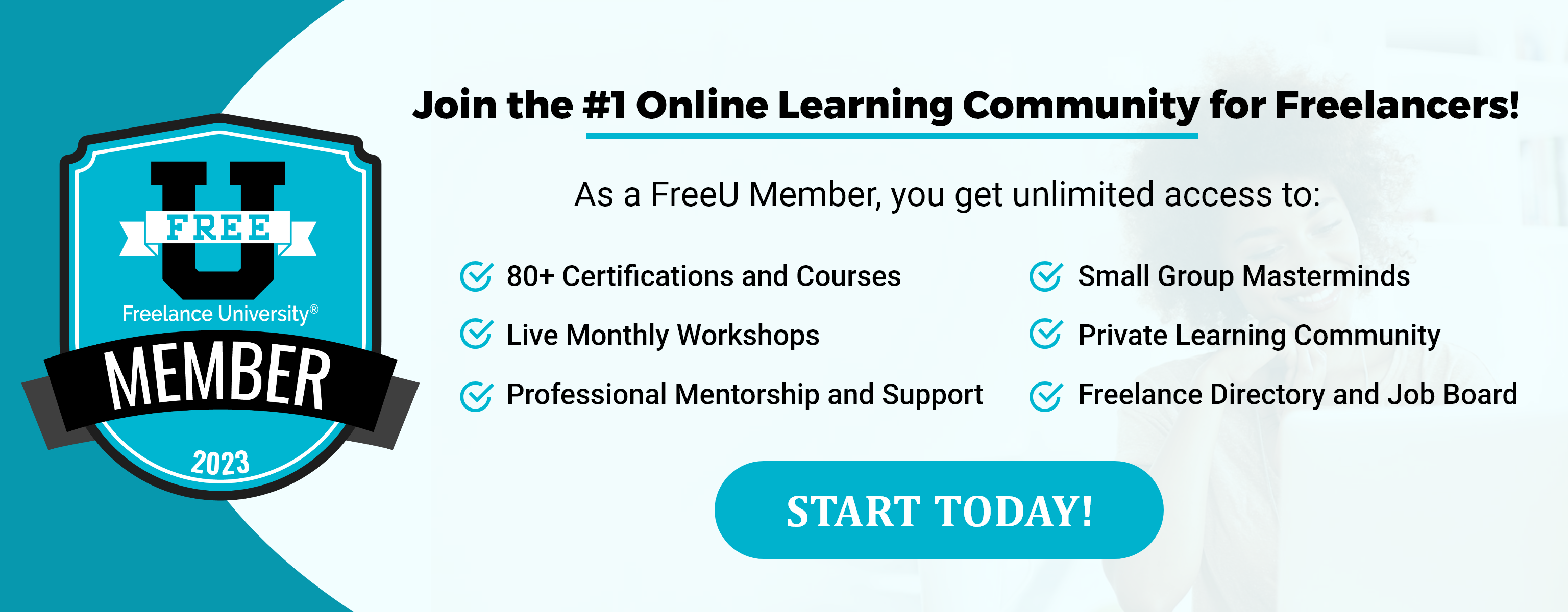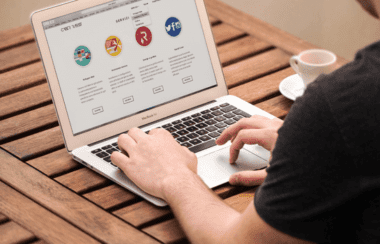How to Transition from Employee to Freelancer
By Jena Kroeker

Have you ever wanted to be like a superhero? When you’re ready to switch from one role to another, you could simply run into a phone booth and run out again, wearing a new costume and wielding new superpowers? If you’re an employee transitioning to a freelancer role, you probably wish it could be that simple.
In our Freelance University community, many of our students begin building their freelance businesses while maintaining a corporate job or other type of employment. This endeavor involves changing hats and adapting quickly to different work cultures. Employee by day, freelancer by night (or on weekends).
As we journey together, we often hear from students who are ready to freelance full-time. What began as a side project introduced them to a new adventure and new freedoms. Sometimes they’re nearing retirement while working for a corporation. Sometimes they’re a working parent, longing to spend more time with family. And sometimes they’ve fallen on hard times, perhaps losing their previous job and wanting a more resilient, adaptable career path.
Whatever the case, the decision to transition from employee to freelancer can feel both exciting and challenging. After being used to Casual Fridays in a corporation, you suddenly realize you’re free to enjoy Casual Mondays, Casual Januarys, or even Casual 2023. You also realize you now have different responsibilities than you did when you were an employee. How do you make the switch from Super Employee to Super Freelancer?
Well, if you can find a phone booth, it’s worth a try. But if not, never fear. Follow these five strategies to exchange your corporate background for a freelance lifestyle.
Five Ways to Transition from Employee to Freelancer
1. Check your entrepreneurial readiness.
In the Entrepreneur’s Mindset course for new freelancers and virtual assistants, FreeU co-founder and instructor Craig Cannings walks us through a series of questions to determine our “entrepreneurial readiness.” They involve crucial factors to consider when you’re just starting out on your freelance journey. For example, you can assess your mindset, virtual lifestyle, commitment, transferable skills, and freelance niche selection.
These questions are still important when you’re nearing the crossroads of employment versus freelancing. When you reach that point, it’s time to revisit those considerations to ensure you’re ready to embark on the next stage of your journey.
In particular, you’ll want to check your mindset and virtual lifestyle by asking yourself questions like these:
• What is your level of confidence and optimism about transitioning from employee to freelancer?
• How mentally and emotionally ready are you for the next stage of your “Entrepreneurial Journey”?
• Do you have a growth mindset instead of a fixed mindset (e.g. willing to try new things rather than sticking to what you know)?
• What is your comfort level transitioning from a corporate office to a “location-independent” environment?
• Do you feel you can be productive and effective while working from home?
• Do you feel you will be able to strike a healthy balance between your business and your personal priorities when you’re in charge of your schedule?
As we discussed in a previous blog post on “Freelancing over 55,” an entrepreneurial mindset can be challenging if you’ve been an employee for a long time. But it’s worth nurturing because it helps you develop healthy client relationships as you embrace the freedom of being your own boss.
2. Build your superpowers.
Every superhero goes through a training process as they embrace their new role. But even Superman needs to make sure he’s ready to change with the times. And the same is true of freelancers and virtual assistants.
If you’ve begun building your freelance business while working as an employee elsewhere, you’ve no doubt acquired new skills that complement your transferable skills. To ensure a smooth transition, make sure you have access to continuous learning. In the past, the corporation you work for likely arranged training seminars and conferences. But now it’s up to you to arrange your own training so you can keep all relevant skills up to date.
For example, in an article titled “15 Things To Do Before Turning Your Side Hustle Into A Full-Time Business,” Kevin Payne advises,
“As with anything in life, the more time you invest into learning and growing as a business owner, the more equipped you’ll be to scale your business. Ways to grow your knowledge include reading books, listening to podcasts, attending industry conferences, and following other successful entrepreneurs. Understand how you learn best and use that knowledge to become a better entrepreneur.”
As he says, the key here is to identify the types of learning that work best for you and take advantage of them. In addition, be sure to maintain a support network around you, “whether employees, mentors, peers, or friends, who motivate, encourage, and help you grow as a person and business owner.” Online communities and mastermind groups are also instrumental in helping you reach the next level in your business.
3. Solidify your business plan.
As you prepare to embrace your new role as freelancer, now is the time to ensure your business plan is rock solid. To illustrate, Craig Cannings outlines “The Building Blocks of an Effective Business Plan” in FreeU’s Define Your Big Why course. So, in addition to clarifying the purpose or “Big Why” of your freelance business, make sure you have the following elements in place:
Your Vision
• Where will you be in one year?
Your Niche
• What types of services will you offer?
Your Audience
• Who will be your primary client audience?
Your Goals
• How will you achieve your vision?
Your Action Plan
• What specific steps do you need to take?
If you’re unsure about your plan, seek additional training or advice from mentors or mastermind groups. When you leave your corporate career, you’ll benefit from having a clear focus and direction for your new business.
Furthermore, as Elizabeth Djinis suggests in her article, “Journalists are switching to freelance. 7 things they wish they knew first,” decide what systems you’ll use to organize projects, deadlines, and payment processes. For example, choose a project management tool like Asana or Trello. And use accounting tools like FreshBooks and HoneyBook to take the stress out of financial management.
In short, solidify your business plan and processes so you’re ready to work effectively with clients while growing and marketing your services.
4. Assess your finances.
This is one of the most important considerations when transitioning from employee to freelancer. If you’re still working in a corporate job, are you ready to let go of your current salary? And if you’re no longer an employee, do you have a plan for how you’ll build a sustainable business?
In his article “How to Smoothly Transition from Full-Time Employment to Freelancing,” Matt Olpinski recommends saving three to six months of the income you’re currently receiving so “you’ll have a safety net if you struggle to get clients right away.” Or you could secure an appropriate number of high-paying freelance clients before leaving your current job.
He also suggests calculating the amount of money you need to maintain your desired lifestyle, while accounting for expenses, taxes, and withholdings. At the same time, keep in mind that you can charge higher rates depending on “your experience, skills, and the value you can provide potential clients.”
Mel Beasley shares some more wise advice in his article, “Full Time Freelancing: Your Latest and Greatest Career Option.” He says,
“It can be helpful to determine what you believe is a reasonable monthly income goal. Determine how much money you need each month in order to live comfortably, then figure out exactly what types of projects and clients are required for that amount. Do a little research to determine what the average hourly rate should be for your industry and skill level. With this information, you can determine how many hours of billable time you’ll need to achieve before officially transitioning from your traditional job and into freelancing.”
And by all means, draw on the wisdom and support of a mentor or freelance community to help you with this step. You can learn a lot from those who have walked this path before you.
5. Make the leap without burning bridges.
If you’re excited about becoming a freelancer and leaving the corporate world behind, it’s tempting to drop everything and quit. But, as the above article says,
“It’s a big jump going from a passion project on the side for extra money to launching a full-time business venture. Consider the pros and cons of going full-time with your side hustle before you take the leap.”
Moreover, it’s important to leave on good terms with your previous employer and colleagues. An article titled “How to Transition from Full-Time to Freelance” recommends giving two to four weeks notice (depending on the length of time you’ve worked for a company) to help your employer find replacements for your job and document your previous responsibilities.
Matt Olpinski’s article above suggests the following strategy, stressing that every manager and company is different:
“If you have a good relationship with your superiors, approach them with honesty. Tell them you’re thinking about freelancing and inquire about any potential conflicts or company policies you may not be aware of.
“Ask them if there’s an ideal time it would make sense for you to make the transitions (try not to leave them hanging in the middle of a big project).”
Above all, be considerate and authentic. Over the past few years, many corporations have discovered the value of freelancers, so your previous employer could be a potential freelance client. As a result, a graceful exit will benefit both of you.
Final Thoughts and Encouragement
If you’re feeling nervous, we hope the above strategies give you greater courage as you make a successful transition from employee to freelancer. And remember these words from John D. Rockefeller:
“Don’t be afraid to give up the good to go for the great.”
When you’re ready, find that phone booth, don your superhero cape, and let your freelance or VA business take flight!
Now we’d love to hear from you. What are some strategies you’d suggest when switching from a corporate background to a freelance business lifestyle? Please share your thoughts in the comments below!










































































































